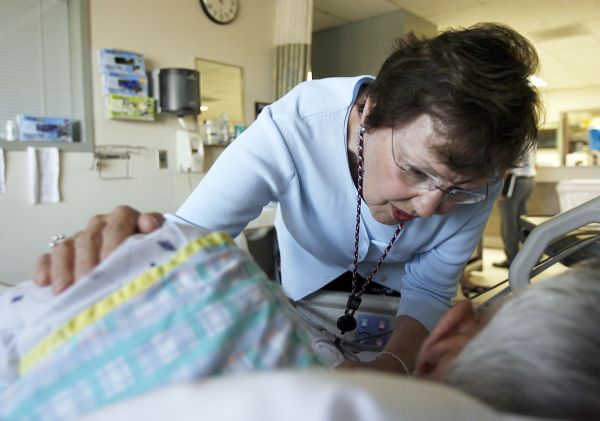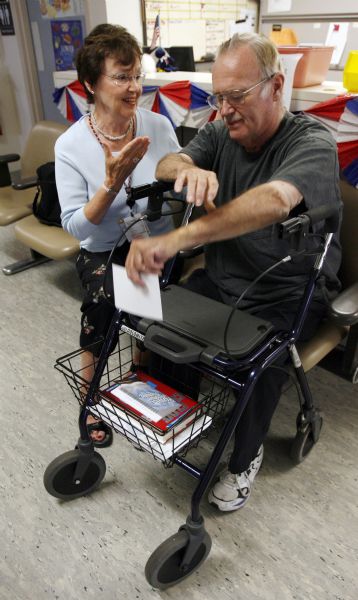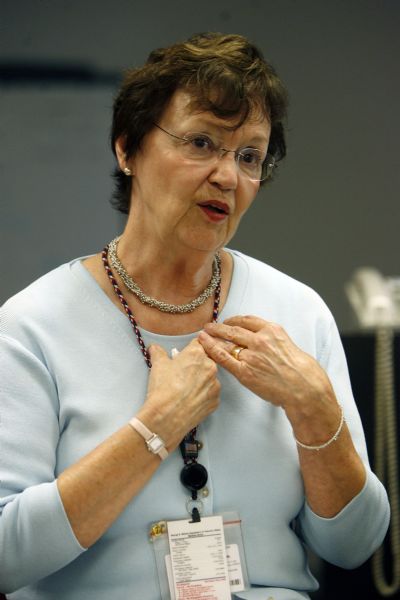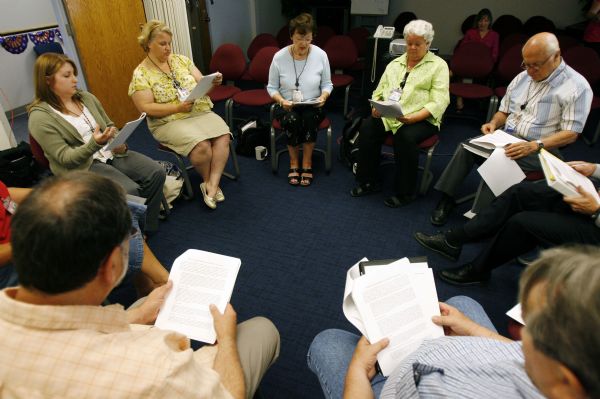This is an archived article that was published on sltrib.com in 2009, and information in the article may be outdated. It is provided only for personal research purposes and may not be reprinted.
Rosemary Baron lightly stroked the patient's arm as he lay curled up and unconscious. She whispered encouraging words and a divine message.
Earlier, Baron sat with another patient at Salt Lake City's Veterans Affairs Medical Center during his three-times-a-week kidney dialysis. She brought him a printed prayer, some Bible verses and a caring, listening heart.
Such visits are part of Baron's training to become a clinical pastoral chaplain, a yearlong program she will complete next week.
"It is, perhaps, the most important work of my life," says Baron, a wife, mother and educator who last year retired as principal at Clayton Middle School in Salt Lake City.
Baron, a Catholic, will join a fellow Catholic, an Anglican, Presbyterian, Methodist, nondenominational Protestant, Buddhist and 13 Mormons, at a graduation ceremony on Thursday. After that, they will go their separate ways.
Some will volunteer, while others get paying jobs, often with hospice organizations. The program prepares them to minister to people of all faiths or no faith.
"I prepare them and train them," says Mark Allison, program coordinator at the VA Medical Center. "God places them."
Since last fall, these 20 would-be chaplains have met every Tuesday and Thursday morning for lectures, training and discussions about everything from the role of empathy in clinician-patient communication and the theology of anger to sacred intimacy, dealing with mental illness and ministering to blended families.
For 10 hours a week, the chaplain candidates also rotated through parts of the hospital, visiting patients and then reflecting on their experiences in reports, personal journals and group analysis. They also have extensive reading assignments in the literature of healing and spirituality.
The program is sponsored by the College of Pastoral Supervision and Psychotherapy and offers its graduates accreditation. It is aimed at the spirituality of both chaplain and patient.
"Where it is absent, introduce it. Where it is dormant, revive it. Where it is alive, sustain it," reads the program's mission statement about patients.
The training also focuses on the prospective chaplain's own faith history, requiring candidates to develop an awareness of themselves as ministers, to articulate central themes of their religious heritage and theological understanding and to apply their training to their own self-improvement.
Before entering the program, Baron's life was characterized by her Catholic upbringing with nurturing parents and loving siblings, a supportive husband and three devoted children. With a graduate degree in education, she spent her career as teacher and learner.
Three years ago, her sister, Mary Ellen, died of complications from ovarian cancer and Parkinson's disease. Baron was overwhelmed by her sister's grace and goodness amid suffering.
One May morning in 2008, Baron woke up and told her husband, she suddenly was ready to retire from her principal's post. Within weeks, she enrolled in the chaplaincy program.
"I have always been a devout Catholic, participating in daily Mass, reading scriptures and spiritual readings, and saying the Rosary," Baron reports in her final presentation to the class. "But what I had not done was really 'look within.' "
She has worked in several hospital departments, including the trauma unit and the "Eagle's Nest," which serves veterans who struggle with substance abuse. In the latter, she worked with groups who integrated American Indian traditions and religious practices. She attended a sweat lodge in midwinter, where she was purified in fire, heat, cool air, changing, prayer, steam, perspiration, cleansing and drumming.
"These ceremonies left an indelible mark on my soul, in my heart," Baron reports. "The spiritual journey has taken me from fixing [problems] to being present, from talking to holy listening, from classifying people to accepting them as living human documents."
According to Steven Gilson, the dialysis patient Baron has been seeing twice a week since December, she has learned her lessons well.
"I had no idea what I wanted until I met Rosemary," says Gilson, a Catholic who hadn't been to church in decades and often cries during his meeting with Baron. "She is the best friend I have ever had. I tell her things I don't tell anyone else. She is a source of joy and comfort. She has changed my life."
pstack@sltrib.com" Target="_BLANK">pstack@sltrib.com
When » Thursday, 11:30 a.m. to 12:30 p.m.
Where » VA Medical Center Chapel, 500 S. Foothill Blvd. (visitors welcome)
Sponsors » George E. Wahlen VA Medical Center Salt Lake City; Salt Lake Chapter of Chaplains; Wasatch (Provo) Chapter of Chaplains; College of Pastoral Supervision and Psychotherapy.









